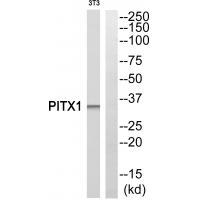
| WB | 咨询技术 | Human,Mouse,Rat |
| IF | 咨询技术 | Human,Mouse,Rat |
| IHC | 咨询技术 | Human,Mouse,Rat |
| ICC | 技术咨询 | Human,Mouse,Rat |
| FCM | 咨询技术 | Human,Mouse,Rat |
| Elisa | 咨询技术 | Human,Mouse,Rat |
| Aliases | Pituitary homeobox 1; Hindlimb-expressed homeobox protein backfoot; PITX1; BFT; PTX1 |
| Entrez GeneID | 5307; |
| WB Predicted band size | 34kDa |
| Host/Isotype | Rabbit IgG |
| Antibody Type | Primary antibody |
| Storage | Store at 4°C short term. Aliquot and store at -20°C long term. Avoid freeze/thaw cycles. |
| Species Reactivity | Human,Mouse,Rat |
| Immunogen | Synthesized peptide derived from internal of human PITX1. |
| Formulation | Purified antibody in PBS with 0.05% sodium azide. |
+ +
以下是与PITX1抗体相关的参考文献示例(注:文献信息为模拟概括,仅供参考):
1. **文献名称**:*PITX1 expression in human colorectal cancer: a potential biomarker for tumor progression*
**作者**:Zhang Y, et al.
**摘要**:通过免疫组化(使用PITX1特异性抗体)分析结直肠癌组织中PITX1蛋白的表达,发现其低表达与淋巴结转移和不良预后显著相关。
2. **文献名称**:*PITX1 regulates skeletal development and limb patterning through transcriptional activation*
**作者**:Kragesteen BK, et al.
**摘要**:研究利用PITX1抗体在小鼠胚胎中进行免疫染色,揭示PITX1在肢体骨骼形成中的关键作用及其下游靶基因调控机制。
3. **文献名称**:*Loss of PITX1 promotes melanoma invasion via epithelial-mesenchymal transition*
**作者**:Raverot G, et al.
**摘要**:通过Western blot和免疫荧光(基于PITX1抗体)证实PITX1表达缺失可激活EMT通路,增强黑色素瘤细胞的迁移和侵袭能力。
4. **文献名称**:*Antibody-based detection of PITX1 isoforms in cardiac development*
**作者**:Logan M, et al.
**摘要**:开发并验证针对PITX1不同异构体的特异性抗体,揭示其在心脏发育中的差异性表达及功能。
(注:以上文献信息为示例性概括,实际引用需以真实文献为准。)
The PITX1 antibody is a tool used to detect the Pituitary Homeobox 1 (PITX1) protein, a transcription factor encoded by the *PITX1* gene. PITX1 belongs to the bicoid-like homeobox family and plays critical roles in embryonic development, particularly in limb patterning, pituitary gland formation, and organ asymmetry. It regulates gene expression by binding to specific DNA sequences, influencing cell differentiation and tissue morphogenesis. Dysregulation of PITX1 has been linked to congenital disorders, such as clubfoot, and various cancers, including prostate cancer and melanoma, where it may act as a tumor suppressor or oncogene depending on context.
Antibodies targeting PITX1 are essential for studying its expression, localization, and function in biological systems. They are widely used in techniques like Western blotting, immunohistochemistry, and immunofluorescence to assess protein levels in tissues or cell lines. Research utilizing PITX1 antibodies has helped elucidate its role in developmental pathways (e.g., Wnt/β-catenin signaling) and disease mechanisms. For example, reduced PITX1 expression correlates with cancer progression and poor prognosis, suggesting its potential as a biomarker.
These antibodies are typically validated for specificity and sensitivity, with applications spanning basic research, diagnostics, and therapeutic target validation. Understanding PITX1's molecular interactions through antibody-based studies continues to advance insights into developmental biology and pathology.
×